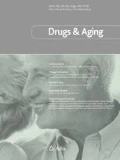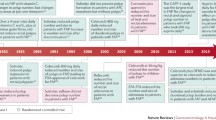Abstract
Large bowel cancer is not only the third most frequent cancer in the world but is one of the most common human malignancies in Western countries, including North America. In recent years, multidisciplinary research in epidemiology, molecular biology, and laboratory animal model studies have contributed much to our understanding of the aetiology of this cancer; more importantly, it has enabled us to devise preventive strategies. Several epidemiological studies have detected a 40 to 50% decrease in risk of colorectal cancer in individuals who regularly use aspirin and other nonsteroidal anti-inflammatory drugs (NSAIDs). Clinical trials with NSAIDs in patients with familial adenomatous polyposis have demonstrated that treatment with NSAIDs caused regression of pre-existing adenomas. Preclinical efficacy studies have provided scientifically sound evidence as to how NSAIDs act to retard, block, or reverse colonic carcinogenesis. Equally exciting are opportunities for effective chemoprevention with selective cyclo-oxygenase-2 inhibitors in a variety of animal models of colon cancer. Selective cyclo-oxy-genase-2 inhibitors such as celecoxib have been proven to be effective chemo-preventive agents against colonic carcinogenesis with minimal gastrointestinal toxicity. Our exploration of the multistep process of carcinogenesis has provided substantial insights into the mechanisms by which anti-inflammatory agents modulate these events. There is growing optimism for the view that realisation of preventive concepts in large bowel cancer will also serve as a model for preventing malignancies of the prostate and breast.


Similar content being viewed by others
References
World Health Organization. The World Health Report 1996. Geneva, World Health Organization, 1997
Landis SH, Murray T, Bolden S, et al. Cancer statistics, 1999. CA Cancer J Clin 1999; 49: 9–31
Wattenberg LW. Chemoprevention of cancer. Cancer Res 1985; 45: 1–8
Potter JD, Steinmetz K. Vegetables, fruit and phytoestrogens as preventive agents. Publication no. 139. Lyon: International Agency for Research on Cancer Scientific Publications, 1996
International Agency for Research on Cancer Handbooks of Cancer Prevention. Non-steroidal anti-inflammatory drugs. Vol. 1. Lyon: International Agency for Research on Cancer, 1997
Taketo MM. Cyclooxygenase-2 inhibitors in tumorigenesis (Pt I). J Natl Cancer Inst 1998; 90: 1529–36
Kelloff GJ. Prospectives on cancer chemoprevention research and drug development. Adv Cancer Res 2000; 78: 199–334
Thun MH, Namboodiri MM, Heath Jr CW. Aspirin use and reduced risk of fatal colon cancer. N Engl J Med 1991; 325: 1593–6
Rosenberg L, Palmer JR, Zauber AG, et al. A hypothesis: nonsteroidal anti-inflammatory drugs reduce the incidence of large bowel cancer. J Natl Cancer Inst 1991; 83: 355–8
Kune GA, Kune S, Watson LF. Colorectal cancer risk, chronic illness, operations and medications: case-control results from the Melbourne Colorectal Cancer Study. Cancer Res 1988; 48: 4399–404
Waddel WR, Ganser GF, Cerise EJ, et al. Sulindac for polyposis of the colon. Am J Surg 1989; 157: 175–9
Narisawa T, Satoh M, Sano M, et al. Inhibition of initiation and promotion on N-methylnitrosourea-induced colon carcinogenesis in rats by non-steroidal anti-inflammatory agent indomethacin. J Jpn Surg Soc 1998; 99: 362–7
Pollard M, Luckert PH. Effect of piroxicam on primary intestinal tumors induced in rats by N-methylnitrosourea. Cancer Lett 1984; 25: 117–21
Reddy BS, Rao CV, Rivenson A, et al. Inhibitory effect of aspirin on azoxymethane-induced colon carcinogenesis in F344 rats. Carcinogenesis 1993; 14: 1493–7
Labayle D, Fischer D, Vielh P, et al. Sulindac causes regression of rectal polyps in familial adenomatous polyposis. Gastroenterology 1991; 101: 635–9
Giardiello FM, Hamilton SR, Krush AJ, et al. Treatment of colonic rectal adenomas with sulindac in familial adenomatous polyposis. N Engl J Med 1993; 328: 1313–6
Giovannucci E, Rimm EB, Stampfer MJ, et al. Aspirin use and the risk for colorectal cancer and adenomas in male health professionals. Ann Int Med 1994; 121: 241–6
Greenberg ER, Baron JA. Prospects for preventing colorectal cancer. J Natl Cancer Inst 1993; 85: 1182–4
Reddy BS, Maruyama H, Kelloff G. Dose-related inhibition of colon carcinogenesis by dietary piroxicam, a nonsteroidal anti-inflammatory drug, during different stages of rat colon tumor development. Cancer Res 1987; 47: 5340–6
Rao CV, Rivenson A, Simi B, et al. Chemoprevention of colon carcinogenesis by sulindac, a non-steroidal anti-inflammatory agent. Cancer Res 1995; 55: 1464–72
Wargovich MJ, Chem CD, Harris C, et al. Inhibition of aberrant crypt growth by non-steroidal anti-inflammatory agents and differentiation agents in the rat colon. Int J Cancer 1995; 60: 515–9
Reddy BS, Tokumo K, Kulkarni N, et al. Inhibition of colon carcinogenesis by prostaglandin synthesis inhibitors and related compounds. Carcinogenesis 1992; 13: 1019–23
Kawamori T, Rao CV, Seibert K, et al. Chemopreventive activity of celecoxib, a specific cyclooxygenase-2 inhibitor, against colon carcinogenesis. Cancer Res 1998; 58: 409–12
Jacoby RF, Marshall DJ, Newton M, et al. Chemoprevention of spontaneous intestinal adenomas in the APCMinmouse model by the nonsteroidal anti-inflammatory drug piroxicam. Cancer Res 1996; 56: 710–4
Boolbol SK, Dannenberg AJ, Chadburn A, et al. Cyclooxygenase-2 overexpression and tumor formation are blocked by sulindac in a murine model of familial adenomatous polyposis. Cancer Res 1996; 56: 2556–60
Marnett LJ. Aspirin and the potential role of prostaglandins in colon cancer. Cancer Res 1992; 52: 5575–89
Eberhart CE, DuBois RN. Eicosanoids and the gastrointestinal tract. Gastroenterology 1995; 109: 285–301
Kargman SL, O’Neill GP, Vickers PJ, et al. Expression of prostaglandin G/H synthase-1 and-2 protein in human colon cancer. Cancer Res 1995; 55: 2556–9
DuBois RN, Radhika A, Reddy BS, et al. Increased cyclo-oxygenase-2 levels in carcinogen-induced rat colonic tumors. Gastroenterology 1996; 110: 1259–62
Tsujii M, DuBois RN. Alterations in cellular adhesion and apoptosis in epithelial cells overexpressing prostaglandin endoperoxide synthase-2. Cell 1995; 83: 493–501
Oshima M, Dinchuk JE, Kargman SL, et al. Suppression of intestinal polyposis in APCΔ716 knockout mice by inhibition of cyclooxygenase 2 (COX-2). Cell 1996; 87: 803–9
Taketo MM. Cyclooxygenase-2 inhibitors in tumorigenesis (Pt II). J Natl Cancer Inst 1998; 90: 1609–20
Reddy BS, Rao CV, Seibert K. Evaluation of cyclooxygenase-2 inhibitor for potential chemopreventive properties in colon cancer. Cancer Res 1996; 56: 4566–9
Reddy BS, Hirose Y, Lubet R, et al. Chemoprevention of colon cancer by specific cyclooxygenase-2 inhibitor, celecoxib, administered during different stages of carcinogenesis. Cancer Res 2000 Jan 15; 60: 293–7
Reddy BS. Novel approaches to the prevention of colon cancer by nutritional manipulation and chemoprevention. Cancer Epidemiol Biomarkers Prev 2000; 9: 239–47
Acknowledgements
Current and past studies on chemoprevention of colon cancer are supported by USPHS Grants CA-17613, CA-80003, CP-33208, CN-85095, CN-45191, CN-25450, CP-05721, CP-05721, and CN-55150, from the National Cancer Institute. Thanks are due to Laura Nast for preparation of the manuscript.
Author information
Authors and Affiliations
Corresponding author
Rights and permissions
About this article
Cite this article
Reddy, B.S., Rao, C.V. Colon Cancer. Drugs & Aging 16, 329–334 (2000). https://doi.org/10.2165/00002512-200016050-00002
Published:
Issue Date:
DOI: https://doi.org/10.2165/00002512-200016050-00002



